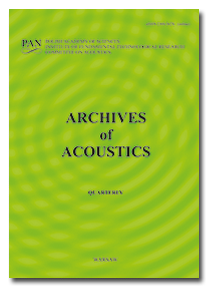Archives of Acoustics,
36, 3, pp. 575–601, 2011
3D Multi-Domain MFS Analysis of Sound Pressure Level Reduction Between Connected Enclosures
In this paper, the authors study the 3D propagation of sound waves between
two closed spaces. The separation element between the two rooms is considered to
include either a small opening or a homogeneous lightweight panel, coupling the two
spaces. A numerical study of this configuration is performed, trying to understand
the influence of the position and geometry of this opening in the sound pressure level
reduction curve at low and midfrequencies. Additionally, the coupling effect between
the two acoustic spaces is analyzed, in order to better understand its importance
when determining the sound pressure level reduction. Different boundary conditions
are ascribed to the walls of these rooms, simulating both the completely reflecting
and partially absorbing surfaces.
The numerical modelling was performed using a multi-domain formulation of the
Method of Fundamental Solutions (MFS). The system is composed of two coupled
rooms, limited by rigid or by absorbing walls, and separated by a thin wall (tending
to null thickness) with a small opening. An experimental validation of the pro-
posed model is presented, comparing its results with those found experimentally for
a reduced-scale model. It is important to note that, for such a configuration, a tra-
ditional single-domain approach using methods like the MFS or the BEM would
lead to undetermined equation systems, and thus the proposed model makes use of
a domain decomposition technique.
two closed spaces. The separation element between the two rooms is considered to
include either a small opening or a homogeneous lightweight panel, coupling the two
spaces. A numerical study of this configuration is performed, trying to understand
the influence of the position and geometry of this opening in the sound pressure level
reduction curve at low and midfrequencies. Additionally, the coupling effect between
the two acoustic spaces is analyzed, in order to better understand its importance
when determining the sound pressure level reduction. Different boundary conditions
are ascribed to the walls of these rooms, simulating both the completely reflecting
and partially absorbing surfaces.
The numerical modelling was performed using a multi-domain formulation of the
Method of Fundamental Solutions (MFS). The system is composed of two coupled
rooms, limited by rigid or by absorbing walls, and separated by a thin wall (tending
to null thickness) with a small opening. An experimental validation of the pro-
posed model is presented, comparing its results with those found experimentally for
a reduced-scale model. It is important to note that, for such a configuration, a tra-
ditional single-domain approach using methods like the MFS or the BEM would
lead to undetermined equation systems, and thus the proposed model makes use of
a domain decomposition technique.
Keywords:
Method of Fundamental Solutions; domain decomposition; closed spaces; sound pressure level reduction
Full Text:
PDF
Copyright © Polish Academy of Sciences & Institute of Fundamental Technological Research (IPPT PAN).





